Through the Millennium Cohort Study we have been following the lives of over 19, 500 people since they were born in the UK at the turn of the new century. We carry out regular surveys, known as ‘sweeps’, to collect information about cohort members’ physical, socio-emotional, cognitive and behavioural development over time, alongside detailed information on their daily life, behaviour and experiences.
The fifth MCS survey took place during 2012 when participants were aged 11. Here you can read our initial findings from the age 11 sweep which cover a range of themes, from family structure to child cognitive development.
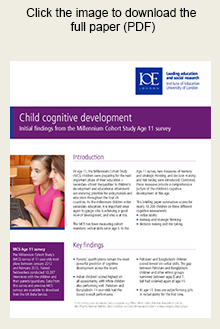
Child cognitive development
Key findings from this briefing include:
- At age 11, boys outperformed girls in verbal ability for the first time
- Parent’s qualifications remain the most powerful predictor of cognitive development across the board
- Indian children scored highest on all assessments, with White children also performing well
Read the briefing paper here.
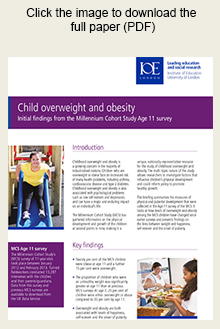
Child overweight and obesity
This paper highlights:
- The measures of physical and pubertal development that were collect in the age 11 sweep
- How levels of overweight and obesity among the cohort have changed since earlier sweeps
- Findings on the links between weight and happiness, self-esteen and the onset of puberty
Read the briefing paper here.
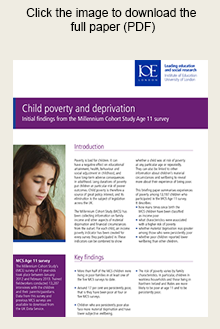
Child poverty and deprivation
This paper describes:
- How many times since birth cohort members have been classified as income poor
- What characteristics were associated with a higher risk of poverty
- Whether material deprivation was greater among those who were persistently poor
Read the briefing paper here.
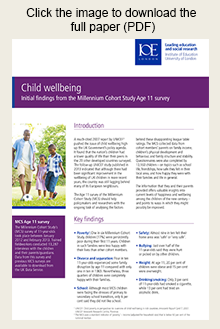
Child wellbeing
Key findings from this briefing include:
- One in six cohort members were persistently poor during their first 11 years. Children in such families were less happy with their lives than other cohort members.
- Just over half of the 11-year-olds said they were hurt of picked on by other children
- Four in ten 11-year-olds experienced some family disruption by age 11 compared with only one in ten in 1969.
Read the briefing paper here.
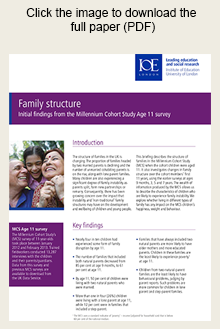
Family structure
This paper investigates:
- The structure of families in the Millennium Cohort Study when the cohort members were age 11 and whether these have changed during the cohort members’ life
- The characteristics of children who are likely to experience family instability
- Whether living in different types of family has any impact on the cohort members’ happiness, weight and behaviour.
Read the briefing paper here.
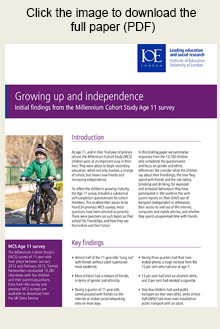
Growing up and independence
Key findings from this briefing include:
- Almost half of the 11-year-olds ‘hung out’ with friends without adult supervision most weekends
- Nearly a quarter of 11-year-olds communicated with friends via the internet or visited social networking sites on most days
- 13% had tried an alcoholic drink, and 3% had smoked a cigarette
Read the briefing paper here.










